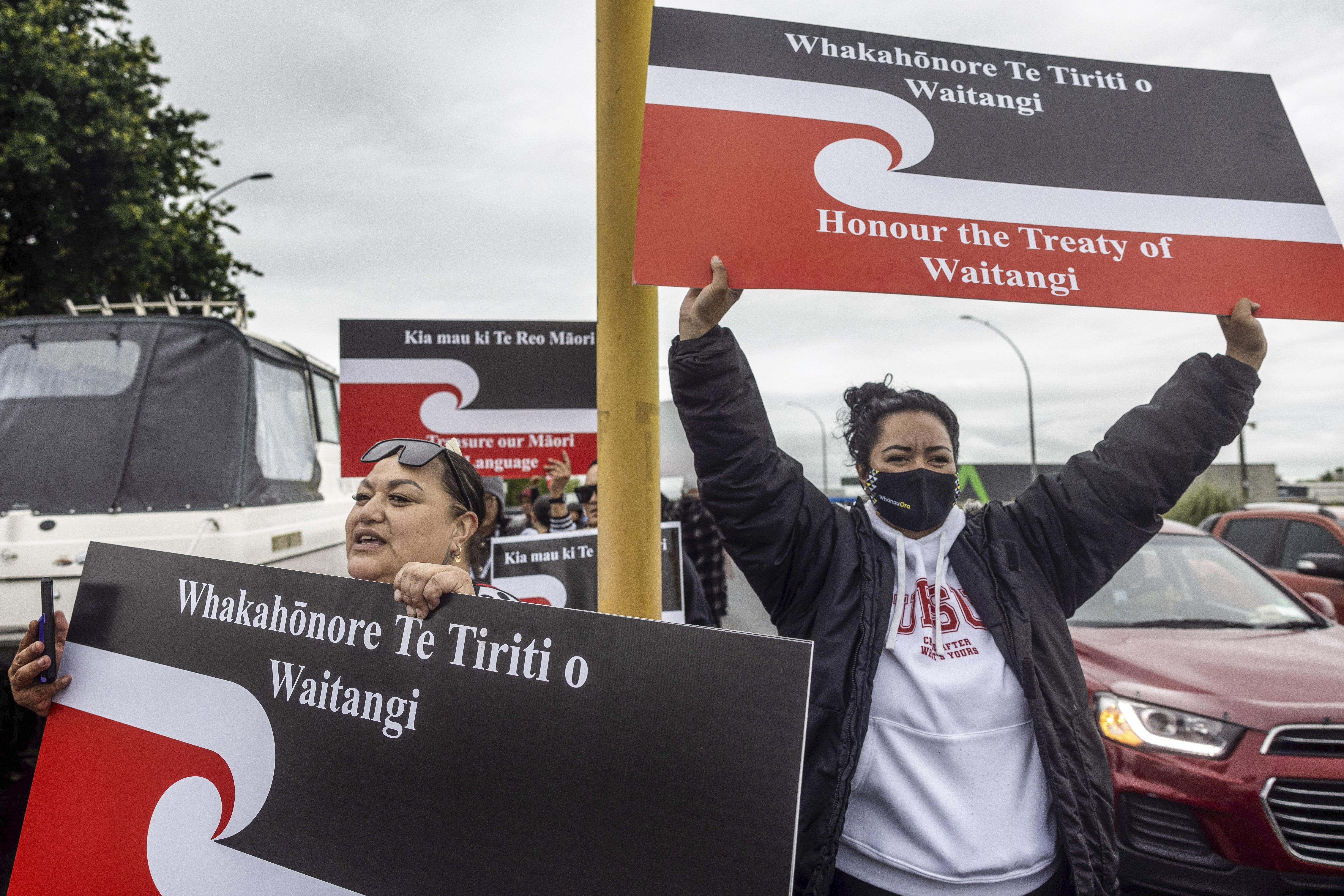 National Maori Action Day demonstrators protest in Hamilton, New Zealand, Dec 5, 2023. (PHOTO / AP)
National Maori Action Day demonstrators protest in Hamilton, New Zealand, Dec 5, 2023. (PHOTO / AP)
WELLINGTON - Plans by New Zealand's conservative government to roll back Maori rights reforms have revived race as a hot political issue in the Pacific nation, which was previously lauded globally for its advances on Indigenous matters.
Thousands of protesters have taken to New Zealand's streets this month against proposed legislation and plans that critics describe as the most significant step backwards for Maori rights in decades, but which the new government says address voters' concerns about the direction of the policy in recent years.
The right of centre government, which won power at an October election, is promising to undo policies of the previous progressive Labour government, in particular those that promote the official use of Maori language and seek to enhance Indigenous living standards and rights.
The emergence of the conservative power bloc, a coalition led by Prime Minister Christopher Luxon of the National party, also comes as the number of Maori members of parliament hits a record high, some of whom are key advocates of the new agenda.
Among them is David Seymour, leader of junior coalition partner ACT New Zealand, a libertarian party behind a controversial bill that would redefine the legal interpretation of the Treaty of Waitangi, the country's founding document underpinning claims of Maori sovereignty.
ALSO READ: NZ Maori lawmakers protest King Charles at parliament's opening
"Where will New Zealand be in 50 years’ time if the current path continues, where Kiwis are offered different rights based on their ancestry?" Seymour said in response to emailed questions from Reuters.
Deputy Prime Minister Winston Peters, a political veteran and leader of fellow coalition partner New Zealand First who is of Maori and Scottish heritage, also wants more clarity around how the treaty is defined in law. Peters was unavailable for a Reuters' interview.
The Luxon government is also seeking to lift a ban on smoking, restart oil and gas exploration and pull out of the United National Declaration on the Rights Indigenous People.
There are now a record 33 legislators of Maori heritage, or 27 percent of New Zealand's parliament. That's up from 21 percent in the 2020 election and more than the 17 percent in the national population
Much of the shift to the right comes amid broader frustrations from middle-class New Zealanders about rising living costs and rural sector anger at increased environmental regulation.
Many, though not all, of the policies the government is looking to overturn were introduced by former Labour prime minister Jacinda Ardern, who shot to global prominence in the last decade as a socially progressive outlier when many other Western countries appeared to veer towards populist politics.
New Zealand's foreign policy is unlikely to change considerably with Luxon signalling a bipartisan approach. However, Peters, who is also foreign minister, said last month he would like to strengthen US strategic and security engagement.
Polarization
Gareth Hughes, a political commentator and former Green Party politician, said politics in New Zealand has hardened and in some senses was catching up with the polarisation seen elsewhere.
"Projects that 20 years ago might not have been seen as controversial such as cycle ways or collective bargaining power for workers or the steady increase in the use of te reo (Maori language) and Maori cultural practices in our society have become totemic cultural battles," he said.
 A Maori warrior blows into a shell during a ceremonial welcome ahead of the Women's World Cup quarterfinal soccer match between Japan and Sweden at Eden Park in Auckland, New Zealand, Aug 11, 2023. (PHOTO / AP)
A Maori warrior blows into a shell during a ceremonial welcome ahead of the Women's World Cup quarterfinal soccer match between Japan and Sweden at Eden Park in Auckland, New Zealand, Aug 11, 2023. (PHOTO / AP)
Illustrating that polarisation, the Greens, a leftist party focused on the environment and social justice, won 15 seats in 2023, its best result.
While Seymour acknowledges the Treaty of Waitangi is a national "taonga", Maori for treasure, he described its principles as "vague, free-floating ideas for activist judges and officials to divine".
A poll jointly published by lobby group Taxpayers' Union and market researcher Curia in October found 60 percent of New Zealanders supported ACT’s proposal to clarify the definition of the treaty's principles, while 18 percent opposed it.
Differences of views even within the Maori community over the direction of policy, as seen in the positions of Seymour and Peters, reflect an increasing divergence in the way many Maori see their ethnicity.
While the government has the majority it needs to pass the laws, there is now considerable pushback from a new generation of Maori leaders, many of whom have just been elected.
ALSO READ: New NZ government to trim spending, pledges relief on costs
There are now a record 33 legislators of Maori heritage, or 27 percent of New Zealand's parliament. That's up from 21 percent in the 2020 election and more than the 17 percent in the national population.
Te Pati Maori, a party focused on Indigenous rights, tripled the number of seats in parliament to 6, or nearly 4.9 percent of the legislature, including the election of 21-year-old Hana-Rawhiti Maipi-Clarke, the youngest MP in more than 150 years.
"We've got a right in a democracy to protest, and you'll start to see various forms of that, and in a more invigorated way, than we're probably seeing in other places where indigenous people have had to assert their mana (power)," said John Tamihere, Te Pati Maori president.


